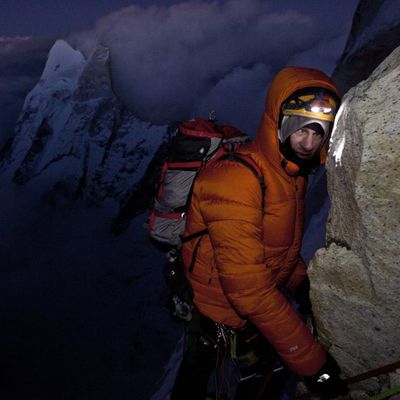
One of the most holy shit documentaries ever made, Meru chronicles the attempts of a trio of American climbers to scale a 21,850-foot Himalayan mountain that is, as the author Jon Krakauer puts it onscreen, “gnarly” for about 4,000 of its last 5,500 feet and then gets really insane, ending in a smooth, vertical, 1,500-foot wall of rock (a “shark fin”) leading to a tip that can barely accommodate a human body — in the unlikely event that one manages to reach it.
Yes, Everest is taller by more than 2,000 feet, and an infamous killer — there are still around 120 corpses, many mummified, on its slopes, among them the legendary British folk hero George Mallory. But that most famous of all mountains also calls to a certain kind of person: Climb me. I don’t know who’d look at Mount Meru and think that. The shark fin pretty much sums it up.
One of the climbers, Jimmy Chin, directed the film with his wife, Elizabeth Chai Vasarhelyi, and it’s a savvy piece of storytelling, drifting back and forth between the hair-raising trek and the events that led each man to the slopes of Meru. Wiry, chiseled Conrad Anker is the celebrity of the trio. (The other two will be after this film hits.) In 1999, working for National Geographic, he was the one who actually found the body of Mallory on Everest, where it had lain for 75 years. Although he’s as giddy as a child as he approaches Meru past praying Indians — it’s at the headwaters of the Ganges River, a holy place — Anker admits to other feelings when he’s interviewed at his home in Bozeman, Montana. His “sensei,” Mugs Stump, died on Denali. His longtime partner, Alex Lowe, perished in an avalanche in Tibet that Anker miraculously survived. The makers of Meru don’t fill you in on the background of Anker’s wife and kids until late in the film — if you don’t know, I won’t spoil the revelation. I’ll just say it adds even more to our anxiety for his well-being.
Chin is an awesome physical specimen. Photographed against a black drop-cloth, his shoulders stretch from one side of the screen to the other. He looks impregnable. Raised by a hard-driving dad who fled repression in China, he made a promise to his mother, after choosing to spend his life climbing mountains or documenting (for TV series, films, and commercials) adventures that get people killed, that he wouldn’t die before she did. Now that she’s gone, he’s less cautious. Not reckless, though. As Anker points out as members of his team suffer from lack of food, frostbite, and something called trench foot, “If you die taking a stupid risk, you’re not just dead, you’ve embarrassed yourself.” Chin is not a man who’d want to embarrass himself.
Renan Ozturk — an awesomely agile rock-scaler with less experience than Chin — has the first doubts about their climb. But he later proceeds up the mountain while recovering from near-fatal injuries. Broken ribs? Smashed skull? Bashed vertebrae? Back on the horse!
Although no one in Meru mentions it, Chin and Ozturk are not only climbing but also filming their climb, which accounts for a vibe out of The Blair Witch Project. I was sure there would be a crawl at the end that said, This footage was discovered at the bottom of a crevice. The three climbers were never seen again. How could they have photographed one another in the middle of “Himalayan big wall climbing” — straight up a sheer face where every pickax strike can bring down a heavy sheet of rock, at temperatures as low as 20 below zero? At one point, the trio “bivies” (short for bivouacks) on the side of Meru with 19,000 feet of air below them. Their tent is vertically pitched — and then comes a four-day storm. But someone went out and shot the tent from a distance in the storm. Madness!
You’ve probably seen mountains in movies as spectacular as in Meru, some of them shot from helicopters (or they’re CGI). Touching the Void was a wow, and I’ll bet there are films I’ve missed (some featuring Anker, Chin, Ozturk, and Krakauer) that are heavier on the awe. But this one gets my vote for the gnarliest. Mount Meru is too scary-looking to lend itself to either inspiration or mysticism, and composer J. Ralph — who scored Man on Wire and Chasing Ice, among other films — doesn’t nudge the visuals in either direction. He brings out what’s alien in the landscape. I could have done without the fish-eye lenses Chin uses in some shots, but they do squeeze a lot of vista into the frame. My only serious complaint: What kind of idiots smoke cigarettes at 20,000 feet?
Meru is a packed 90 minutes. And I guess it is inspiring, in the sense that if human beings can endure this kind of risk and punishment, they could colonize Mars or breed a super-race to carry our species to the ends of the galaxy. All the familiar critical adjectives (harrowing, etc.) sound especially lame in this context. The movie is sick.





